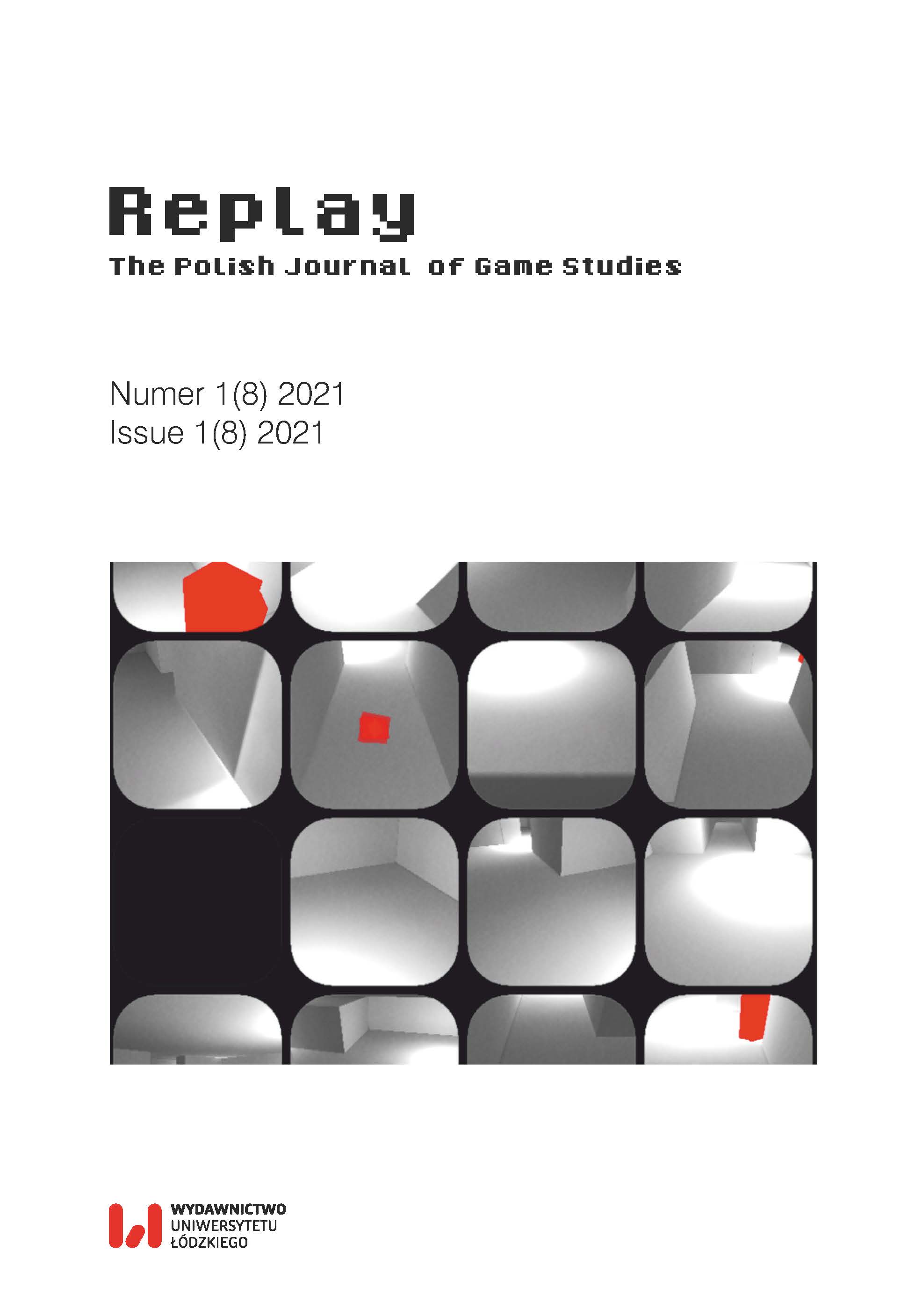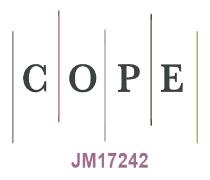About Game-Satires
DOI:
https://doi.org/10.18778/2391-8551.08.06Keywords:
video games, game-satires, game-stories, non-games, adventure gamesAbstract
This paper proposes introducing a new category to describe certain digital games – “game-satire” (“gropowiastka”) – similar to literary philosophical satires. The author takes as his point of departure the term “game-story” (“gropowieść”) proposed by Tomasz Z. Majkowski, which usually refers to games that are rich in meaning and leave the player with a large margin of freedom. In contrast to the game-stories, the game-satires impose both the order of overcoming challenges and a particular flow of narration; the vision of the gameworld suits the thesis assumed by the creators. The term “game-satires” can include, for example, adventure games, autobiographical games, newsgames and “walking simulators.” The proposed concept would make it possible to challenge the rigid division of ludic software into “games” and “non-games” and more easily incorporate them into artistic discourse.
References
Aarseth, E. (2001). Computer Game Studies, Year One. Game Studies, 1(1) http://www.gamestudies.org/0101/editorial.html (data dostępu: 6 września 2021).
Google Scholar
Aarseth, E. (2012). A Narrative Theory of Games. Proceedings of the International Conference on the Foundations of Digital Games (s. 129–133) https://doi.org/10.1145/2282338.2282365
Google Scholar
DOI: https://doi.org/10.1145/2282338.2282365
Aarseth, E. (2014). Cybertekst. Spojrzenie na literaturę ergodyczną (tłum. M. Pisarski, P. Schreiber, D. Sikora, M. Tabaczyński). Kraków–Bydgoszcz: Wydawnictwo Ha!art.
Google Scholar
Bakun, M. (2019). Algorytmy osobiste. Analiza zagadnienia amatorskich gier autobiograficznych udostępnionych na platformie itch.io. Zeszyty Naukowe Towarzystwa Doktorantów Uniwersytetu Jagiellońskiego. Nauki Humanistyczne, 24(1), 9–24 https://doi.org/10.26361/ZNTDH.10.2019.24.01
Google Scholar
Beeson, D., Cronk, N. (2009). Voltaire: Philosopher or philosophe? W: N. Cronk (red.), The Cambridge Companion to Voltaire (s. 47–64). Cambridge: Cambridge University Press.
Google Scholar
DOI: https://doi.org/10.1017/CCOL9780521849739.004
Bogost, I. (2007). Persuasive Games: The Expressive Power of Video Games. Cambridge: MIT Press.
Google Scholar
DOI: https://doi.org/10.7551/mitpress/5334.001.0001
Bogost, I. (2020). Curiosity Journalism, or the First Decades of Newsgames. Convergence, 26(3), 572–576 https://doi.org/10.1177/1354856520918075
Google Scholar
DOI: https://doi.org/10.1177/1354856520918075
Cabales, V. (10 czerwca 2019). A Brief Introduction to Newsgames. Northwestern University Knight Lab https://knightlab.northwestern.edu/2019/06/10/newsgames-intro/ (data dostępu: 28 sierpnia 2022).
Google Scholar
Churchill, W. (2004). Kill the Indian, Save the Man: The Genocidal Impact of American Indian Residential Schools. San Francisco: City Lights.
Google Scholar
Churchill, W., Morris, G.T. (1992). Sand Creek: The Morning After. W: M.A. Jaimes (red.), The State of Native America: Genocide, Colonization, and Resistance (s. 13–21). Boston: South End Press.
Google Scholar
de la Hera Conde-Pumpido, T. (2017). Persuasive gaming: Identifying the different types of persuasion through games. International Journal of Serious Games, 4(1), 31–39.
Google Scholar
DOI: https://doi.org/10.17083/ijsg.v4i1.140
Diderot, D. (2021/1796). Kubuś fatalista i jego pan (tłum. T. Boy-Żeleński). Warszawa: Fundacja Nowoczesna Polska https://wolnelektury.pl/media/book/pdf/kubus-fatalista-i-jego-pan.pdf (data dostępu: 3 września 2021).
Google Scholar
Eskelinen, M. (2001). The Gaming Situation. Game Studies, 1(1) http://www.gamestudies.org/0101/eskelinen/ (data dostępu: 6 września 2021).
Google Scholar
Fernandez-Vara, C. (2011). From „Open Mailbox” to Context Mechanics: Shifting Levels of Abstraction in Adventure Games. Proceedings of the 6th International Conference on Foundations of Digital Games (s. 131–138). New York, NY: ACM http://hdl.handle.net/1721.1/100262 (data dostępu: 7 lipca 2022).
Google Scholar
DOI: https://doi.org/10.1145/2159365.2159383
Frasca, G. (1999). Ludology Meets Narratology: Similitude and Differences Between (Video)Games and Narrative https://ludology.typepad.com/weblog/articles/ludology.htm (data dostępu: 6 września 2021).
Google Scholar
Giappone, K.B.R. (2015). Self-Reflexivity and Humor in Adventure Games. Game Studies, 15(1). http://gamestudies.org/1501/articles/bonello_k (data dostępu: 6 września 2021).
Google Scholar
Gómez-García, S., de la Hera Conde-Pumpido, T. (2022). Newsgames: The Use of Digital Games by Mass-Media Outlets to Convey Journalistic Messages. Games and Culture https://doi.org/10.1177/15554120221105461
Google Scholar
DOI: https://doi.org/10.1177/15554120221105461
Jankowski, F. (2020). Galaktyka Hegla. „Event[0]” jako gra (post)humanistyczna. Kwartalnik Filmowy, 110, 120–136 https://doi.org/10.36744/kf.142
Google Scholar
DOI: https://doi.org/10.36744/kf.142
Juul, J. (2001). Games Telling Stories? A Brief Note on Games and Narratives. Game Studies, 1(1). http://www.gamestudies.org/0101/juul-gts/ (data dostępu: 6 września 2021).
Google Scholar
Juul, J. (2010). Gra, gracz, świat: W poszukiwaniu serca „growości”. W: M. Filiciak (red.), Światy z pikseli (s. 37–62). Warszawa: Wydawnictwo SWPS Academica.
Google Scholar
Juul, J. (2019). Handmade Pixels: Independent Video Games and the Quest for Authenticity. Cambridge–London: The MIT Press.
Google Scholar
Kagen, M. (2017). Walking Simulators, #GamerGate, and the Gender of Wandering. W: J. Eburne, B. Schreier (red.), Nerds, Wonks, and Neocons (s. 275–300). Bloomington: Indiana University Press.
Google Scholar
DOI: https://doi.org/10.2307/j.ctt20060h2.15
Karhulahti, V.-M. (2014). Puzzle Is Not a Game! Basic Structures of Challenge. W: P. Calia, H. Kennedy, J. Sharp (red.), Proceedings DiGRA 2013: DeFragging Game Studies. Atlanta, Georgia: Digital Games Research Association https://archive.ph/zp5wM (data dostępu: 12 czerwca 2022).
Google Scholar
Karhulahti, V.-M. (2015). Defining the Videogame. Game Studies, 15(2) http://gamestudies.org/1502/articles/karhulahti (data dostępu: 6 września 2021).
Google Scholar
Kozyra, M. (2019). Ukryty potencjał queerowych przestrzeni w grach wideo. W: D. Ciesielska, M. Kozyra, A. Łozińska (red.), Retelling. Strategie przestrzenne (s. 173–192). Kraków: Wiele Kropek.
Google Scholar
Kriss, A. (3 września 2015). LucasArts and the Rationalist Tendency in Videogames. Kill Screen. https://archive.ph/7k4FA (data dostępu: 12 czerwca 2022).
Google Scholar
Król, J. (2018). That Dragon, Cancer – dokument osobisty w formie gry komputerowej. Images. The International Journal of European Film, Performing Arts and Audiovisual Communication, 21(30), 151–164 https://doi.org/10.14746/i.2017.30.11
Google Scholar
DOI: https://doi.org/10.14746/i.2017.30.11.
Majkowski, T.Z. (2019). Języki gropowieści. Studia o różnojęzyczności gier cyfrowych. Kraków: Wydawnictwo Uniwersytetu Jagiellońskiego.
Google Scholar
Montfort, N. (2005). Twisty Little Passages: An Approach to Interactive Fiction. Cambridge–London: MIT Press.
Google Scholar
Mukherjee, S. (2015). Video Games and Storytelling: Reading Games and Playing Books. London: Palgrave Macmillan.
Google Scholar
DOI: https://doi.org/10.1057/9781137525055
Natunen, M. (2010). Nuclear Tycoon: Designing Simulation Rhetoric for a Persuasive Game. Praca magisterska, Aalto University https://aaltodoc.aalto.fi:443/handle/123456789/3581 (data dostępu: 22 sierpnia 2022).
Google Scholar
Parker, F. (2013). An Art World for Artgames. Loading…, 7(11), 41–60 https://journals.sfu.ca/loading/index.php/loading/article/view/119 (data dostępu: 3 września 2022).
Google Scholar
Pelurson, G. (2019). Flânerie in the dark woods: Shattering innocence and queering time in The Path. Convergence: The International Journal of Research into New Media Technologies, 25(5–6), 918–936 https://doi.org/10.1177/1354856518772421
Google Scholar
DOI: https://doi.org/10.1177/1354856518772421
Petrowicz, M. (2014). Ludo-narratywizm, czyli proceduralizm Bogosta na tle sporu ludologii z narratologią. Replay. The Polish Journal of Game Studies, 1(1), 81–91.
Google Scholar
Powiastka filozoficzna. (2021). W: Encyklopedia PWN. https://archive.ph/JEAtZ (data dostępu: 12 czerwca 2022).
Google Scholar
Pratt, C.J. (8 luty 2010). The Art History... Of Games? Games As Art May Be A Lost Cause. Game Developer. https://archive.ph/ToT0G (data dostępu: 12 czerwca 2022).
Google Scholar
Reed, A.A., Murray, J., Salter, A. (2020). Adventure Games: Playing the Outsider. London: Bloomsbury Publishing.
Google Scholar
DOI: https://doi.org/10.5040/9781501346576
Ruberg, B. (2020). Straight Paths Through Queer Walking Simulators: Wandering on Rails and Speedrunning in Gone Home. Games and Culture, 15(6), 632–652 https://doi.org/10.1177/1555412019826746
Google Scholar
DOI: https://doi.org/10.1177/1555412019826746
Sartre, J.-P. (2007). Byt i nicość. Zarys ontologii fenomenologicznej (tłum. J. Kiełbasa, P. Mróz, R. Abramciów, R. Ryziński, P. Matochleb). Kraków: Wydawnictwo Zielona Sowa.
Google Scholar
Skrzypek, M. (1982). Diderot. Warszawa: Wiedza Powszechna.
Google Scholar
Sterczewski, P. (2013). Retoryka porażki. Semantyczne i perswazyjne funkcje przegranej w serious games, art games i grach głównego nurtu. Homo Ludens, 5(1), 23–34.
Google Scholar
Strużyna, A. (2014). Artystyczne gry Anny Anthropy. Homo Ludens, 1(6), 187–198.
Google Scholar
Szewczyk, O. (26 listopada 2013). Interaktywne wideo jako powieść. Polityka https://archive.ph/NKn5e (data dostępu: 12 czerwca 2022).
Google Scholar
Tavinor, G. (2008). Definition of Videogames. Contemporary Aesthetics, 6(1) https://digitalcommons.risd.edu/liberalarts_contempaesthetics/vol6/iss1/16 (data dostępu: 28 sierpnia 2022).
Google Scholar
Voltaire. (2021/1759). Kandyd czyli optymizm (tłum. T. Boy-Żeleński). Warszawa: Fundacja Nowoczesna Polska https://wolnelektury.pl/media/book/pdf/kandyd.pdf (data dostępu: 6 września 2021).
Google Scholar
Anthropy, A. (2012). Dys4ia [Windows]. Newgrounds.
Google Scholar
CD Projekt RED. (2015). Wiedźmin 3: Dziki Gon [Windows]. CD Projekt.
Google Scholar
Frasca, G. (2002). September 12th [Flash]. Newsgaming.
Google Scholar
Froggy Software. (1984). Paranoïak [Apple II]. Froggy Software.
Google Scholar
Indian Land Tenure Foundation, LaPensée, E. (2019). When Rivers Were Trails. Michigan State University’s Games for Entertainment and Learning Lab.
Google Scholar
LucasArts. (1991). The Select of Monkey Island [DOS]. LucasArts.
Google Scholar
MECC. (1985). The Oregon Trail [Apple II]. MECC.
Google Scholar
Mojang Studios. (2011). Minecraft [Windows]. Mojang Studios.
Google Scholar
Numinous Games. (2016). That Dragon, Cancer [Windows]. Numinous Games.
Google Scholar
Pażytnow, A. (1984). Tetris [Electronika 60].
Google Scholar
Thatgamecompany (2007). Flow [PlayStation 3]. Sony Computer Entertainment.
Google Scholar
The Quinnspiracy. (2013). Depression Quest [WWW]. The Quinnspiracy.
Google Scholar
Ubisoft Montreal. (2010). Assassin’s Creed II [Windows]. Ubisoft.
Google Scholar
Downloads
Published
How to Cite
Issue
Section
License

This work is licensed under a Creative Commons Attribution-NonCommercial-NoDerivatives 4.0 International License.










